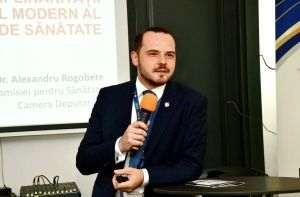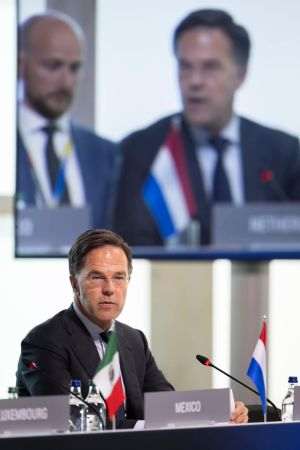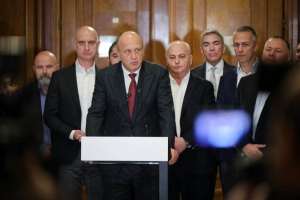President Klaus Iohannis confirmed, yesterday, from the Cotroceni Palace, the news that appeared recently in the Western media according to which the authorities in our country would support him for the position of Secretary General of NATO, after it will remain vacant at the end of the mandate of Jens Stoltenberg.
In a press statement, after reviewing our country's contribution to NATO in the 20 years since joining the political-military alliance, President Iohannis said: "We are in a security context where I believe it is time for our country to assume even greater responsibility within the Euro-Atlantic leadership structures. It is a legitimate aspiration of a state that has seen radical transformations in the last two decades and that could use this experience to shape a new vision of how we can respond quickly and effectively to a varied and complex range of challenges and threats. We have a deep understanding, including from the perspective of the historical challenges our region has faced, of the current security situation, a situation unbalanced by the war launched by Russia against Ukraine. At the same time, I believe that NATO needs, for its part, a renewal of the perspective on its mission. Eastern Europe has a valuable contribution to the discussions and decisions made within NATO. With a balanced, strong and influential representation from this region, the Alliance will be able to make the best decisions that meet the needs and concerns of all member states. For all these reasons, I have decided to enter the competition for the position of Secretary General of NATO. I undertake this candidacy on behalf of Romania with all responsibility, and this decision is based on Romania's performance, the experience accumulated during the two mandates of President of Romania, the deep understanding of the challenges faced by NATO, Europe, and especially our region, and my firm commitment to NATO's core values and objectives."
Klaus Iohannis' announcement comes after several Western countries - the US, Great Britain, France and Germany - initially announced that they supported the candidacy of former Dutch Prime Minister Mark Rutte for the post of NATO Secretary General, a position he had previously announced for himself. candidacy intention and former British Prime Minister Boris Johnson.
Immediately after the president's announcement, there were reactions from political leaders in Bucharest. The President of PNL, Nicolae Ciucă, said that the announcement of President Iohannis basically means the formalization of the candidacy for the position of Secretary General of NATO.
The liberal leader specified: "It is about assuming the representation of Romania at the level of the Alliance 20 years after it became a full member of the North Atlantic Alliance. This candidacy is supported by everything the Romanian Army has achieved in the past 20 years. We will come up with the strongest possible arguments for the need for a perspective for the countries of Central and Eastern Europe. A consensus is needed for any candidate. Each of the candidates will come up with arguments. The countries that will support the candidacy will have their own arguments. Surely a decision will be reached which will be established at the level of the NATO allied countries, at the July summit in Washington".
For his part, the leader of the PSD, Prime Minister Marcel Ciolacu, did not offer a reaction until the close of the edition, but we recall that on February 23, when asked about a possible candidacy of President Iohannis for the position of Secretary General of NATO, the head of the Government said: " A Romanian in one of the tallest structures in the world. I support and will always support, no matter what temporary position I will hold, any Romanian for a high position within the European Commission, the European Parliament, the European Council, NATO".
On the other hand, some representatives of the parliamentary opposition believe that the head of state has no chance at occupying the post of NATO Secretary General.
USR deputy, Nicu Fălcoi, vice-president of the NATO Parliamentary Assembly, told BURSA newspaper: "President Klaus Iohannis' announcement is nothing new. It was known about this, the rumors of the last period did not appear for free, but because Romania announced through unofficial channels that President Iohannis will run for this position. It is true that at the moment we know that the US, France, Germany and the UK have declared their support for the post of former Dutch Prime Minister Mark Rutte, but there is strong opposition to this nomination from allied states in Eastern Europe. In my opinion, I think it is not possible for President Klaus Iohannis to hold the position of Secretary General of NATO. In recent years, Romania held the position of Deputy Secretary General of NATO through Mr. Mircea Geoană, and I don't think that our whole country will give the future secretary general of the alliance because there are states that will oppose and that will say that they should also hold such a position. Even if Romania helped Ukraine, there are extremely few people who know how it helped and how much, while the Baltic countries supported Ukraine militarily on the face and could issue claims regarding occupying the post of NATO Secretary General. In any case, I believe that the future Secretary General of NATO must be a political leader from Eastern Europe, but I doubt that Mr. Klaus Iohannis has a chance to occupy this position".
Ludovic Orban, the president of Right Force told us that he does not want to comment on the statement of President Klaus Iohannis, because he does not have all the necessary information about the chances that he would have in the announced candidacy for the post of NATO Secretary General.
• Duties of the Secretary General of NATO
The Secretary General chairs the North Atlantic Council - the main political decision-making body of the Alliance - as well as other high-level decision-making committees. He has the authority to propose topics for discussion and intervene for the peaceful settlement of disputes between member states. It acts as a decision facilitator, leading and guiding the consensus-building and decision-making process across the Alliance. At the same time, the Secretary General of the Alliance maintains direct contact with the heads of state and government and with the ministers of foreign affairs and defense from NATO and partner countries. This involves regular visits to NATO and partner countries, as well as bilateral meetings with senior national officials when they visit NATO headquarters.
The Secretary General is the main spokesperson of the Alliance and represents the Alliance publicly on behalf of the member countries, reflecting their common positions on political issues.
Furthermore, the Secretary General is the senior executive officer of NATO's International Staff, being responsible for appointing staff and overseeing their work.
In terms of his election, the Secretary General is a high-ranking political figure from a NATO member country, appointed by member states for a four-year term. The selection is made through informal diplomatic consultations between member countries, which propose candidates for the post. No decision is confirmed until a consensus is reached on a candidate.




























































